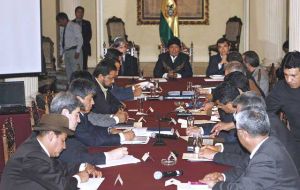MercoPress. South Atlantic News Agency
Morales and Bolivian opposition could only agree on group photo
 Pte. Morales (center) in a meeting with the Governors
Pte. Morales (center) in a meeting with the Governors Bolivian President Evo Morales and opposition governors failed to reach an agreement on Sunday after weeks of negotiations and the dispute over a new constitution apparently will be decided by Congress calling a national referendum on the issue.
The conflict between Morales, the country's first indigenous elected president, and governors demanding more autonomy and opposed to his Socialist oriented policies and draft constitution, sparked violent clashes with killings and torching of government property. The unrest shook four provinces run by conservative leaders where anti-Morales groups raided public buildings, attacked energy facilities and blocked roads. However following an eleven hours meeting, the opposition governors and President Morales had a group picture taken and even shook hands while international observers watched on. Agriculture Minister Carlos Romero, speaking after the meeting in Cochabamba blamed the governors for failure to reach an agreement, but acknowledged the government had agreed to a few opposition demands for increased autonomy. "That they didn't sign on only means they have a political agenda," he said. Mario Cossio, the governor of the gas-rich Tarija region who spoke on behalf of the four opposition governors, said he hoped the failed talks would not mark a return to violence. "These democratic differences do not mean an opening of a cycle of confrontations and violence," he said. Cossio said that there had been "serious disagreements" regarding the governors' demands for more autonomy and a larger share of the country's booming energy revenues. A fifth opposition governor was arrested last month accused of being responsible for the deaths of at least 15 Indian peasants in the northern Pando province during the clashes. The talks started in mid-September but stalled last month when the opposition asked for significant changes to a draft constitution approved last year in an elected assembly they had boycotted. "We never suggested we should draw up a new constitution. We proposed that it was imperative that we discussed a host of issues," said Cossio. Morales says the new constitution is a tool to grant more rights to the long-neglected indigenous majority, but the governors want the charter rewritten, saying it would allow the president to amass too much power. The government has vowed to send a bill to Congress to allow for a referendum on the draft constitution to take place in the coming months and Morales has said he wants to call for a general election after the Constitution is approved. However to convene a constitutional referendum a two thirds majority is needed but Mr. Morales dominates the Lower House and the opposition the Senate. To have the constitutional draft approved Morales supporters organized a sit in round Congress impeding access to opposition members. Peasant movements have promised a similar action for mid October. The representative from the Union of South American Nations, Unasur, Juan Gabriel Valdes and the Organization of American States delegate Dante Caputo, acting as observers, said the fact an agreement was not signed following the talks is not a failure, and were optimistic about both sides willingness to continue talking. "It's unfortunate there have been no agreements but there have been advances", said Mr. Valdes. "We were not witnesses of failure, we have seen a great advance in positions and this is positive and must be valued", he insisted. Although President Morales won an August recall vote with 67% of support, the bulk of the opposition governors also achieved sweeping victories in their constituencies. Morales' power base is among poor indigenous peasants in the western highlands but his reforms are unpopular among Spanish descendents and mixed-raced people in the wealthier regions (hydrocarbons and agriculture) governed by the opposition.




Top Comments
Disclaimer & comment rulesCommenting for this story is now closed.
If you have a Facebook account, become a fan and comment on our Facebook Page!